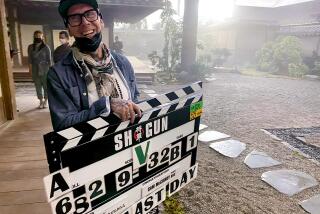OFF-CENTERPIECE : MOVIES : Hollywood Scared of the Japanese? (You Say They <i> Like</i> This Movie?!)
- Share via
Since hitting the bookstores on Valentine’s Day, Michael Crichton’s “Rising Sun”--a controversial thriller set in a Los Angeles that is economically, politically and culturally saturated by the Japanese--has topped the bestseller lists for two weeks. With 350,000 hardcover copies in print, it’s the author’s most successful novel to date.
“The media has suggested that, no matter what your position on the issues, this is ‘The Book’--one that demands to be read,” says Paul Bogaards, promotion manager for publisher Alfred A. Knopf.
Before the heat surrounding the book has cooled, “Rising Sun” will become a $29-million movie tentatively starring Sean Connery and Wesley Snipes and directed by “The Right Stuff’s” Philip Kaufman. Shooting is scheduled to begin in June.
It may be the book to read, but Crichton’s arguably xenophobic “Rising Sun” was a tough sell to Hollywood. With Universal, Columbia and TriStar under Japanese ownership, the growing importance of the Japanese moviegoing audience, and the influx of yen into Hollywood as a whole, only 20th Century Fox put in a bid.
Fox studio chief Joe Roth recalls being handed the manuscript last summer as he was embarking on a business trip--to Japan. “I saw the book as a ‘wake-up call,’ ” he says. “The notion of the United States as a Third World nation taken over by a superior civilization fascinated me. Whether the material was ‘politically correct’ never occurred to me.”
Roth did, however, sound out Walter Senior, Fox’s head of international distribution, as well as some Japanese theater owners, before making his move.
“The Japanese market is very, very important--No. 2 in the world after the United States,” explains Roger Birnbaum, Fox’s president of worldwide production. “To ignore this fact would be foolish, giving up some of our distribution possibilities.”
The Japanese, Roth found, raised few objections. “The exhibitors didn’t regard ‘Rising Sun’ as a slap in the face,” he maintains. “They felt it portrayed the Japanese as a smart, tough-minded, technologically advanced group of people at economic war with America--exactly how they see themselves.”
Fox paid Crichton $1 million for the rights--only two-thirds the sum he received for his last novel, “Jurassic Park,” a dinosaurs-on-the-loose story Steven Spielberg is directing for Universal.
According to CAA’s Bob Bookman, who represents Crichton, “Universal’s Tom Pollock and Peter Guber (head of Sony Pictures Entertainment--the parent company of Columbia and TriStar) expressed interest in the project but ultimately passed. Warner Bros. and Paramount expressed remorse they lost out--after the deal closed. It isn’t surprising. The knee-jerk reaction was that it was a ‘Japan-bashing book,’ though I don’t see it that way.”
Crichton saw “Rising Sun” as a perfect opportunity for the studios to deflect charges of foreign influence. “If Universal or Columbia (owned by Matsushita and Sony, respectively) wanted to put allegations to rest, they could have submitted low-ball offers--a fraction below what Fox bid,” he suggests. “Not to do so was politically stupid because people can charge that no Japanese-owned studio made an offer. Questions are hanging in the air.
“This picture isn’t ‘Jurassic Park,’ ” says Crichton philosophically. “It’s not a huge picture with traditional entertainment values that offends no one--except, perhaps, people who feel that tyrannosauruses shouldn’t be abused. ‘Rising Sun’ is a good paranoid thriller--with a point. It appeals to a very different segment of the film community and the public.”
Crichton wrote the original screenplay along with first-timer Michael Backes. (Director Kaufman also took a turn before handing it over to playwright David Mamet for a “polish.”) Contrary to published reports, Crichton says, no one urged him to soften the anti-Japanese bias--in the book or the screenplay.
“This is a longstanding rumor I’ve been unable to shake,” he says. “I only changed 141 words between the first and last galleys, not because of pressure but because of accuracy. One paragraph I fixed was less anti-Japanese--but the other two were more so.”
When the movie gets underway, Sean Connery is expected to play the lead--a seasoned detective on the trail of a killer. In what Birnbaum terms a “perfect example of colorblind casting,” Fox hopes Wesley Snipes, also in the final stage of negotiations, will portray Connery’s police department protege. “I thought that the relationship between a black investigator and the Japanese would stir things up a little bit,” he says of Snipes.
Roth expects no controversy--providing the material is handled in a non-exploitive way. CAA’s Bookman is also optimistic.
“There’s great sensitivity to the Japanese now, but Crichton doesn’t take any cheap shots,” he says. “Anyhow, from a practical point of view, you have only two hours to tell a story. It’s the entertainment aspects, not the inflammatory material, which are stressed.”
More to Read
Sign up for our Book Club newsletter
Get the latest news, events and more from the Los Angeles Times Book Club, and help us get L.A. reading and talking.
You may occasionally receive promotional content from the Los Angeles Times.










